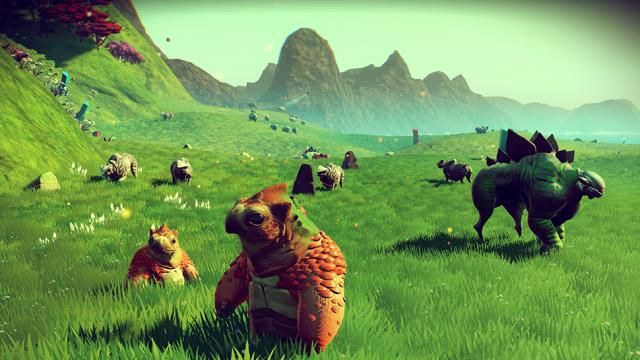No Man’s Sky was arguably the most anticipated game of 2016 after it was announced at E3 2014. Our friends at Kotaku have already committed tons of their time to the procedurally-generated space exploration adventure, which promises a “truly open universe,” filled with seemingly infinite things to explore.
Players have been taking advantage of it, already reporting that around 10 million different species have already been discovered, as reported by the game’s lead developer Sean Murray. Most noteworthy is the claim that No Man’s Sky contains more species than have been discovered on Earth.
For instance over night we hit 10 million species discovered in NMS… that’s more than has been discovered on earth.
WHAT IS GOING ON!!!— Sean Murray (@NoMansSky) August 10, 2016
But is this true? Considering that our knowledge of our planet is less than complete, this number seems kind of low. Murray is correct about the number of discovered species, but there’s no way to be sure about the full number.
According to the last study that focused on trying to figure out this precise number, co-authored by a member of the United Nations Environment Programme (UNEP), there are approximately 8.7 million discovered species (give or take 1.3 million). The study, which was released in 2011, suggested that around 6.5 million of those were found on land and 2.2 million were found in water. However, the reseach comes with a caveat: 86 per cent of all land species and 91 per cent of water ones have “yet to be discovered, described or catalogued.”
The research also doesn’t take into account certain micro organisms or viruses, which aren’t deemed with the term “species” for the purposes of the study. It applies to the “five known eukaryote kingdoms of life,” including animals, plants, fungi, protozoa, and chromists (such as certain types of algae).
Additionally, a 2013 Science study put the number of described species at 1.5 million, with the total number being around five million (plus or minus three million), so the figures differ wildly. These studies also don’t take into account the number of extinct species.
But could No Man’s Sky come close to the exact number of species on Earth? Probably not, since a study published in May by researchers at Indiana University put that number at around one trillion.
According to a statement, the researchers put together a database of animal, plant, and microbial species that resulted in around 5.6 million species from around the world, not including Antarctica. Then, they intersected that with universal scaling laws and genetic sequencing technology in order to take into account the sheer number of microbial speices that aren’t included in similar studies.
“Older estimates were based on efforts that dramatically under-sampled the diversity of microorganisms,”said Jay T. Lennon, an associate professor of biology and co-author on the study.
Scaling laws are used to predict numbers of plant and animal species, and were used here to estimate how the number of microbes scaled with the area of the landscape.
“Until now, we haven’t known whether aspects of biodiversity scale with something as simple as the abundance of organisms,” Kenneth J. Locey, a postdoctoral fellow and co-author, said. “As it turns out, the relationships are not only simple but powerful, resulting in the estimate of upwards of 1 trillion species.”
If only life were more like No Man’s Sky, which was able to uncover that many species so quickly (plus space, of course). According to UNEP, identifying all remaining species would take 300,000 biologists around 1,200 years. We’ll probably just play No Man’s Sky instead.
[H/T Sean Murray]
